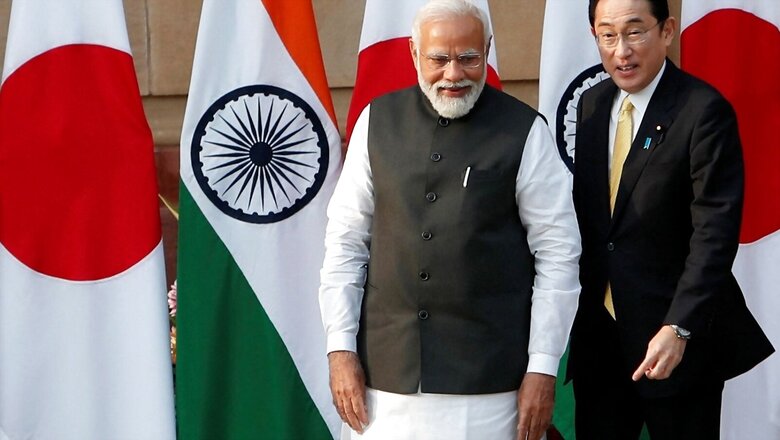
views
Japanese Prime Minister Fumio Kishida’s first visit to India brought with it an investment plan of Rs 3.2 lakh crore in the next five years, indicating that the India-Japan partnership will only deepen. Prime Minister Narendra Modi welcomed the massive boost that such an investment target would provide to the country’s economy and said India was committed to providing “all possible support to Japanese firms”.
Part of Quad, Kishida and Modi, in their bilateral meeting on Saturday, also discussed China’s presence in the South China Sea as well as India’s standoff with China in eastern Ladakh. The two leaders agreed that strong India-Japan ties will encourage peace, prosperity, and stability in the Indo-Pacific region.
During their discussion on the Ukraine situation following Russia’s invasion, Kishida described Moscow’s actions against the eastern European country as a “serious matter that has shaken the basis of international norms”.
The two sides inked six agreements providing for the expansion of bilateral cooperation in a range of areas, besides a separate clean energy partnership.
Here are the highlights from PM Modi’s Japanese counterpart Kishida’s visit to India, which will come to an end early on Sunday:
Japan’s massive investment target
Kishida, who began his address with Namaskar that brought a smile on PM Modi’s face, said his $42-billion investment plan will bring massive benefits for several industries in India, especially when it comes to the development of urban infrastructure to green energy.
Referring to bilateral trade ties, Kishida said Japan has an investment target of five trillion yen (Rs 3,20,000 crore) in India over the next five years. “We have announced that in the next five years, we will invest five trillion yen in India and we will further strengthen our cooperation,” Kishida said.
The announcement follows the investment promotion partnership of 2014 when both sides had agreed for Japanese investment of 3.5 trillion yen from 2014 to 2019. Following the talks, Japan also announced a sustainable development initiative for the Northeastern region.
Ladakh situation, China’s role
During discussion with Japan, India conveyed that its ties with Beijing cannot be business as usual until peace and tranquility are restored in the high-altitude region.
At a press briefing, Foreign Secretary Harsh Vardhan Shringla the Indian side informed the Japanese delegation about the situation in eastern Ladakh as well as China’s amassing of troops and earlier attempts of multiple transgressions in the region. “We informed Japan of the situation in Ladakh, the attempts of amassing the troops, and our talks with China on border-related issues. The Japanese PM also briefed us on his own perspective vis-a-vis East and South China Sea,” he said.
India and China have been holding military talks to resolve the eastern Ladakh standoff. “In the discussions, the issue of China did come up. Both countries did inform each other about their perspective. We did inform the Japanese side about the situation in Ladakh…also the fact that we were holding talks with China on the border-related issues,” Shringla said.
Discussion on Indo-Pacific
A joint statement said the two prime ministers emphasized that India and Japan, as two leading powers in the Indo-Pacific region, had a shared interest in the safety and security of the maritime domain, freedom of navigation and overflight, and peaceful resolution of disputes. “They reaffirmed their determination to continue prioritizing the role of international law, particularly the United Nations Convention on the Law of the Sea (UNCLOS), and facilitate collaboration, including in maritime security, to meet challenges against the rules-based maritime order in the East and South China Seas,” it said.
Japan has maritime disputes with China in the East China Sea while India has been concerned over Beijing’s increasing assertiveness in the South China Sea region. The statement said Modi and Kishida emphasized the importance of non-militarisation and self-restraint.
“They further called for the full and effective implementation of the Declaration on the Conduct of Parties in the South China Sea and the early conclusion of a substantive and effective Code of Conduct in the South China Sea in accordance with international law, especially UNCLOS, without prejudice to the rights and interests of all nations including those not party to these negotiations,” it said.
Perspectives on Ukraine situation
The two leaders discussed the Ukraine situation and expressed the seriousness about the ongoing conflict and resulting humanitarian crisis. Kishida has described the Russian invasion of Ukraine as a “very serious” matter, saying it has “shaken” the roots of international order. He also told Modi that one-sided efforts to change status quo by force can’t be allowed in any sphere and the Ukraine matter has to be approached with a “strong resolve”.
A joint statement said that Modi and Kishida, in their talks, called for an immediate cessation of violence in Ukraine, pitched for resolution of the conflict through dialogue besides underscoring the importance of safety and security of nuclear facilities in that country. It said the two leaders expressed serious concern over the conflict and assessed its broader implications, particularly to the Indo-Pacific region, as well as the unfolding humanitarian crisis in Ukraine.
Exchange of agreements between India-Japan
India and Japan signed six agreements: Cooperation on cybersecurity; JICA (Japan International Cooperation Agency) loans worth Rs 20,400 crore for infrastructure, connectivity, biodiversity, healthcare; amendments to India Japan Comprehensive Economic Partnership agreement; agreement on decentralised wastewater management; India Japan Competitiveness Partnership Roadmap agreement; and a memorandum on sustainable urban development.
Shringla said, “Both sides agreed on work plans with the import of Japanese apples to India and export of Indian mangoes to Japan.”
Separate clean energy partnership
India and Japan have agreed to extend clean energy partnership to cover EVs, battery storages and green hydrogen as the two Asian economic powerhouse pivot net zero carbon emission pathways. A India-Japan Clean Energy Partnership statement was issued, detailing areas of cooperation.
“India and Japan acknowledge the need to explore a variety of options to ensure a secure and stable supply of energy for achieving both goals of sustainable economic growth and addressing climate change. They share the view that there is no single pathway to achieve a low-carbon economy, but rather there are different paths for each country,” it said. While India is targeting net zero-carbon emission by the year 2070, Japan is looking to achieve the target by 2050.
The two nations agreed to expand the 2007 cooperation under the Japan-India Energy Dialogue to include Electric Vehicles (EV), storage systems including batteries, electric vehicle charging infrastructure (EVCI), development of solar energy including solar PV cells, wind energy and clean coal technologies. They also collaborate on green hydrogen and ammonia, LNG, biofuels and strategic oil reserves.
Meanwhile, Japanese automaker Suzuki Motor Corporation plans to invest USD 1.26 billion for manufacturing electric vehicles and batteries in India, according to a media report. The battery plant is proposed to be set up near Suzuki’s automobile manufacturing unit in Gujarat and the total investment is estimated to be around 150 billion yen (USD 1.26 billion) on the new plant, and also in enhancing production of EVs in India, the Nikkei business daily reported.
‘One team, one project’
Japan has also been supporting infrastructure development in India, including a high-speed rail project. Prime Minister Modi said, “Japan is one of the largest investors in India. India-Japan are working as ‘One team, one project’ on the Mumbai-Ahmedabad high-speed rail corridor,” adding, “today, India presents immense possibilities through ‘Make in India’ for the world.”
Japan is currently supporting India’s urban infrastructure development as well as a high-speed railway based on Japan’s shinkansen bullet train technology.
Looking ahead at Quad summit
For promoting peace, security, and prosperity in the Indo-Pacific region, the prime ministers affirmed the importance of bilateral and plurilateral partnerships among like-minded countries of the region, including the quadrilateral cooperation among Australia, India, Japan, and the US.
“They welcomed the Quad Leaders’ Summits in March and September 2021 and renewed their commitment to delivering tangible outcomes on the Quad’s positive and constructive agenda, especially on Covid vaccines, critical and emerging technologies, climate action, infrastructure coordination, cybersecurity, space, and education,” the joint statement said. It said Modi and Kishida looked forward to advancing Quad cooperation through the next Quad Leaders’ Summit in Japan in the coming months.
Kishida also said, “We’ll hold the next India-Japan talks as soon as possible. We also welcome the agreement of cooperation in cyber security. India’s a very important partner for Japan… I invite PM Narendra Modi for the Quad summit meeting in Tokyo.”
(with inputs from agencies)
Read all the Latest News India and Breaking News here











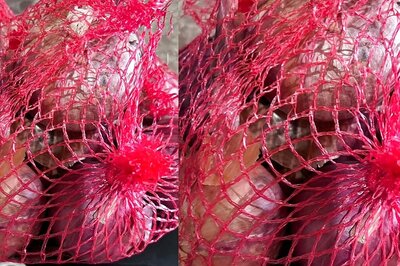
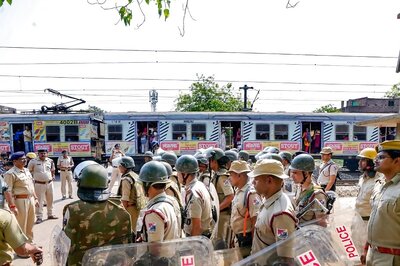
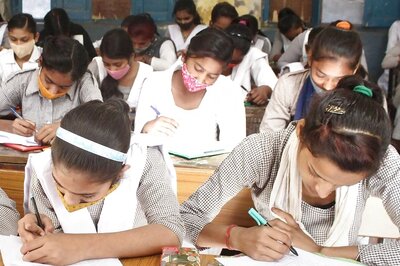
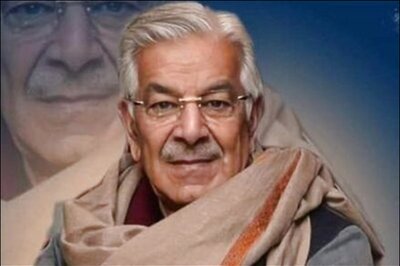




Comments
0 comment